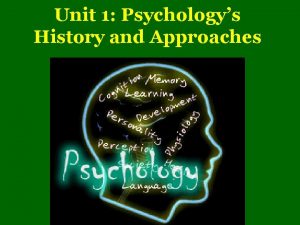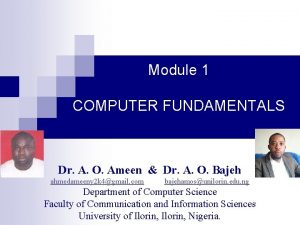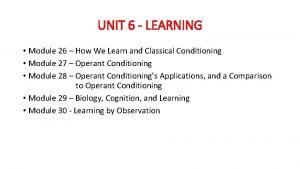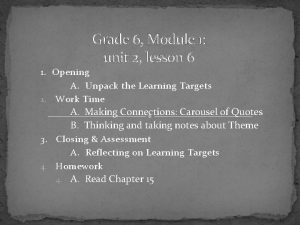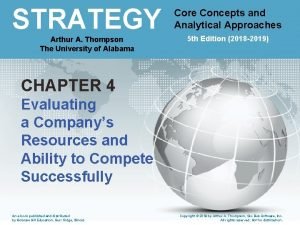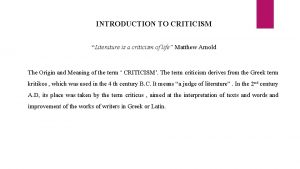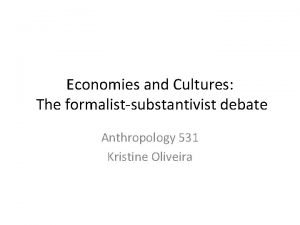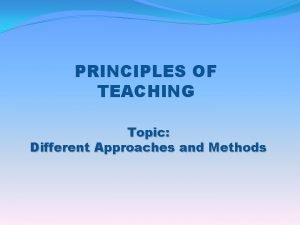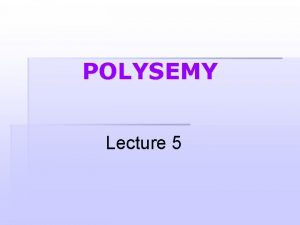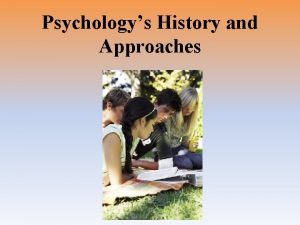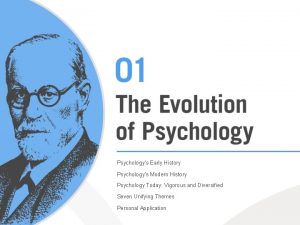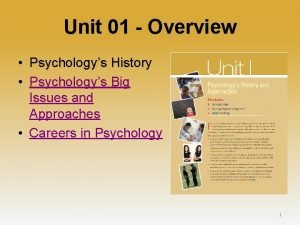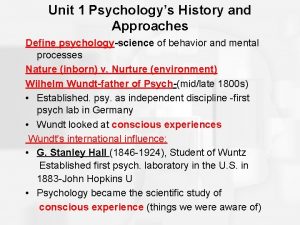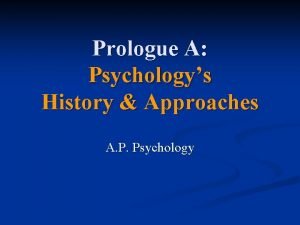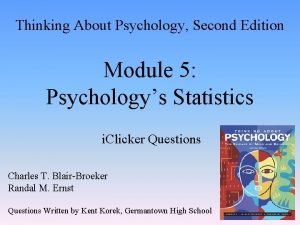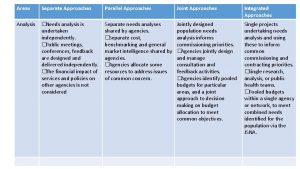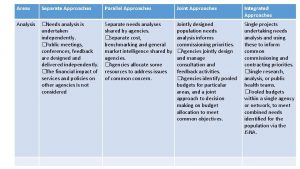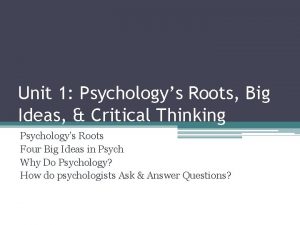Unit 1 Psychologys History and Approaches Module 1
























- Slides: 24

Unit 1 Psychology’s History and Approaches Module 1: Psychology’s History Module 2: Psychology’s Big Issues and Approaches Module 3: Careers in Psychology


On your own piece of paper… • Write 5 adjectives to describe a psychologist: – – – 1 2 3 4 5 • Write 5 adjectives to describe a scientist: – – – 1 2 3 4 5 Crash Course Psychology Episode 1

Prescientific Psychology • Ancient Greeks – Socrates & Plato- mind lives on without body, knowledge is innate – Aristotle – more scientific approach • Rene Descartes – • Francis Bacon – animal spirits in brain fluid noticed that we tend to believe whatever we want to believe • John Locke – Tabula Rasa (blank slate) By the end of the 1600’s, it’s widely accepted that science should be empirical, however psychologist will take hundreds of years to get on board.

Empirical versus Anecdotal Empirical • The view that knowledge originates in experience and that science should, therefore, rely on observation and experimentation Anecdotal • Cool story bro Think and share some examples from real life of when people have the tendency to confuse anecdotal evidence for empirical.

Psychological Science is Born • Wilhelm Wundt (1879) – “Father of Psychology” – University of Leipzig – Reaction time experiment • G. Stanley Hall • John Hopkins University • Psych flourishes in US Congrats…

Thinking About the Mind’s Structure • Edward Titchener – Structuralism – early school of thought promoted by Wundt and Titchner; used introspection to reveal the structure of the human mind.

Thinking About the Mind’s Function • William James – Functionalism – a school of thought promoted by James and influenced by Darwin; explored how mental and behavioral processes function – how they enable the organism to adapt, survive, and flourish Structuralism v. Functionalism

Psychology’s First Ladies • Mary Calkins – Earned a Ph. D at Harvard but was denied it – 1 st female APA president in 1905 • Margaret Floy Washburn – 1 st woman to receive Ph. D in psy – 2 nd female president of APA

Psychological Science Develops • Sigmund Freud • Defined psych as “the science of mental life” • Most recognizable psychologist • Created Psychoanalysis May 6, 1856 – September 23, 1939

Psychological Science Develops • Behaviorism -The belief that psych should only study things we can observe (so no thoughts, dreams, memories, etc. ) – John B. Watson • Rosalie Raynor

John Watson said… “give me a dozen healthy infants, well-formed, and my own special world to bring them up in and I’ll guarantee to take any one at random and train him to become any type of specialist I might select – doctor, lawyer, artist, merchant-chief, and yes, even beggarman and thief…”

Psychological Science Develops • B. F. Skinner (1904 -1990) -Behaviorist – Conditioning – Rewards and consequences – Questioned the existence of free will in humans FYI- our class pet’s name is BF Swimmer.

Psychological Science Develops • Humanistic psychology -focuses on human potential and growth – Carl Rogers – Abraham Maslow • Cognitive Revolution -1960’s brought a time to study all things cognition related

Where are we now? • Psychology • the science of behavior and mental processes • Basically- what we do and how we think









 Unit 1 psychology's history and approaches
Unit 1 psychology's history and approaches Module 2 today's psychology and its approaches
Module 2 today's psychology and its approaches C device module module 1
C device module module 1 Unit 10, unit 10 review tests, unit 10 general test
Unit 10, unit 10 review tests, unit 10 general test Early management examples
Early management examples The salvation history
The salvation history Human open system
Human open system Module 26 ap psychology
Module 26 ap psychology Grade 6, module 1, unit 2 answer key
Grade 6, module 1, unit 2 answer key Vrf troubleshooting
Vrf troubleshooting Grade 6 module 1: unit 2 answer key
Grade 6 module 1: unit 2 answer key English module grade 10 unit 3
English module grade 10 unit 3 Wad approach
Wad approach A company's resources and capabilities represent
A company's resources and capabilities represent Synchronic and diachronic approaches to polysemy
Synchronic and diachronic approaches to polysemy What is expressive criticism
What is expressive criticism Formalist-substantivist debate
Formalist-substantivist debate Content based task based and participatory approaches
Content based task based and participatory approaches Health promotion approaches
Health promotion approaches Approach to learning ib
Approach to learning ib Essay-translation approach example
Essay-translation approach example Mode of discourse in register
Mode of discourse in register Solomon four group design
Solomon four group design Teacher dominated approach
Teacher dominated approach Historical changeability of semantic structure
Historical changeability of semantic structure
